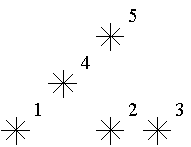hdu 1541/poj 2352:Stars(树状数组,经典题)
Stars
Time Limit: 2000/1000 MS (Java/Others) Memory Limit: 65536/32768 K (Java/Others)
Total Submission(s): 4052 Accepted Submission(s): 1592
Problem Description
Astronomers often examine star maps where stars are represented by points on a plane and each star has Cartesian coordinates. Let the level of a star be an amount of the stars that are not higher and not to the right of the given star. Astronomers want to know the distribution of the levels of the stars.

For example, look at the map shown on the figure above. Level of the star number 5 is equal to 3 (it's formed by three stars with a numbers 1, 2 and 4). And the levels of the stars numbered by 2 and 4 are 1. At this map there are only one star of the level 0, two stars of the level 1, one star of the level 2, and one star of the level 3.
You are to write a program that will count the amounts of the stars of each level on a given map.

For example, look at the map shown on the figure above. Level of the star number 5 is equal to 3 (it's formed by three stars with a numbers 1, 2 and 4). And the levels of the stars numbered by 2 and 4 are 1. At this map there are only one star of the level 0, two stars of the level 1, one star of the level 2, and one star of the level 3.
You are to write a program that will count the amounts of the stars of each level on a given map.
Input
The first line of the input file contains a number of stars N (1<=N<=15000). The following N lines describe coordinates of stars (two integers X and Y per line separated by a space, 0<=X,Y<=32000). There can be only one star at one point of the plane. Stars are listed in ascending order of Y coordinate. Stars with equal Y coordinates are listed in ascending order of X coordinate.
Output
The output should contain N lines, one number per line. The first line contains amount of stars of the level 0, the second does amount of stars of the level 1 and so on, the last line contains amount of stars of the level N-1.
Sample Input
5
1 1
5 1
7 1
3 3
5 5
Sample Output
1
2
1
1
0
Source
Recommend
树状数组,经典题。
这道题里,树状数组的作用是记录到某x坐标的所有星星的数目,这个数目就是该星星的等级,然后把level[]数组对应的等级计数+1。最后输出level数组即可。
树状数组模板:
int lowbit(int x)
{
return x & -x;
}
int sum(int a[],int x) //求出第x个元素之前的和
{
int ans = 0;
while(x>0){
ans+=a[x];
x -= lowbit(x); //向左上爬
}
return ans;
}
void add(int a[],int x,int d,int n) //将编号为x的数加d
{
while(x<=n){
a[x]+=d;
x+=lowbit(x);
}
}
代码:
1 #include <stdio.h>
2 #include <iostream>
3 using namespace std;
4 int lowbit(int x)
5 {
6 return x & -x;
7 }
8 int sum(int a[],int x) //求出第x个元素之前的和
9 {
10 int ans = 0;
11 while(x>0){
12 ans+=a[x];
13 x -= lowbit(x); //向左上爬
14 }
15 return ans;
16 }
17 void add(int a[],int x,int d,int n) //将编号为x的数加d
18 {
19 while(x<=n){
20 a[x]+=d;
21 x+=lowbit(x);
22 }
23 }
24 int main()
25 {
26 int i,n;
27 while(scanf("%d",&n)!=EOF){
28 int level[15010]={0};
29 int x[32010]={0};
30 for(i=1;i<=n;i++){ //输入,计算当前星星前面的总星数(level),对应等级值+1,更新x[]数组
31 int a,b,num=0;
32 scanf("%d%d",&a,&b);
33 level[sum(x,a+1)]++;
34 add(x,a+1,1,32010); //这个位置的星星数+1
35 }
36 for(i=0;i<n;i++) //输出
37 printf("%d\n",level[i]);
38 }
39 return 0;
40 }
Freecode : www.cnblogs.com/yym2013



